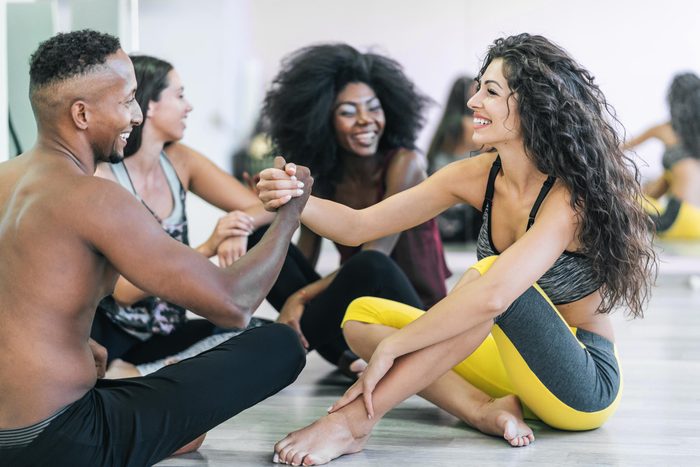
Besides the occasional sweaty machine from the person who used it ahead of you (yeah, yuck)—it’s likely that you didn’t think a ton about the health risks of working out at the gym. Since the pandemic, more of us have started to practice better gym hygiene, while probably hoping our fellow gym-goers are doing the same. “One result of the pandemic is that people are more aware of hygiene and are more vigilant with their behavior in general, but especially in the gym,” says Rachana Adyanthaya, a specialist in modern etiquette and co-host of the podcast Manners Matter 2 with Julia Esteve Boyd. “This is obviously much better for everyone,” Adyanthaya says. “Being more sanitary is not a bad thing!”
Indeed it’s a plus. But while some of our newer gym practices might seem like good manners, experts say not all of them actually help prevent germs. We asked infectious disease doctors to share exactly what you need to do to avoid Covid-19 at the gym and to keep yourself, and others, healthy when you’re engaged in one of the healthiest habits of all: exercise.
The Red Cross Says Doing This Is Essential After Your Flu Shot or Covid Booster
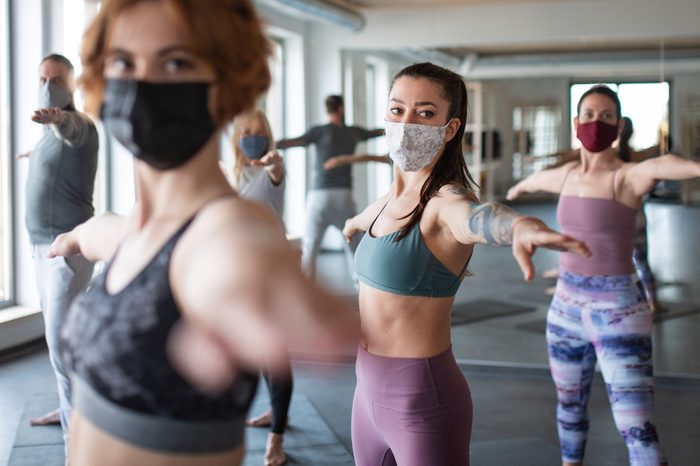
How germs spread in gyms
Kadi Banjoko, an infection preventionist at the Department of Clinical Epidemiology at The Ohio State University Wexner Medical Center, says gyms are the perfect environment for germs, which spreading primarily through contact with contamination and droplet transmission. Here’s why gyms tend to harbor more bacteria, viruses and fungi than other public places:
-
Increased amount of heavy breathing, often in small, enclosed spaces, says Del DeHart, MD, an infectious disease specialist with University of Michigan Health-West. Any diseases transmitted through respiration—including influenza, COVID-19, RSV, and the common cold—will spread faster in a gym than they might in other public spaces.
-
The higher risk of encountering bodily fluids that can be contaminated with bacteria, viruses, and fungi. Sweat, saliva, mucous, feces, blood, and urine can transmit a wide variety of illnesses, including viral colds and flus, gastrointestinal bugs like norovirus, hepatitis C, bacterial skin infections (including the “superbug” MRSA, or Methicillin-resistant Staphylococcus aureus), e. Coli, and blood-borne diseases. These bodily fluids can live on towels, yoga mats, weight benches, bike seats, vending machines, toilets, sinks, handles, and other “high-touch” gym surfaces, says Banjoko.
-
The warm, damp environment that germs thrive in. Saunas, heated yoga studios, shower stalls, hot tubs, swimming pools, and other gym amenities provide the ideal environment to grow bacteria and viruses…but also mold that can cause allergies, as well as fungi that causes ringworm and athlete’s foot. Scientists have even found candida albicans, the fungus that causes vaginal yeast infections, on bike seats.
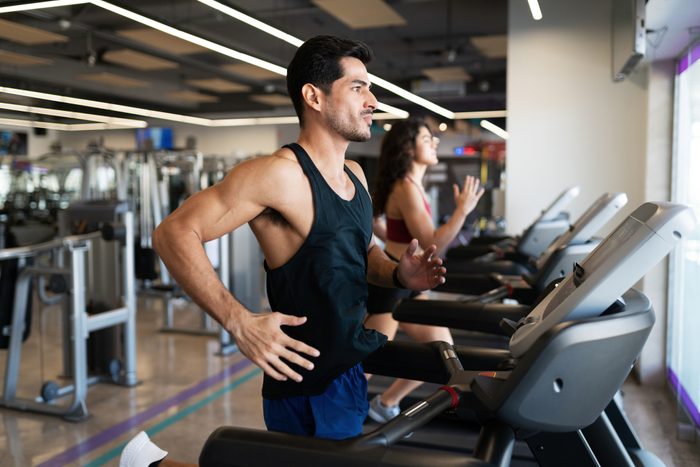
The new rules for gym etiquette since the pandemic
Stand six feet back from others
Whether you’re waiting for your turn to use a machine, sharing equipment on the weight floor, or participating in a group fitness class, don’t stand right next to the person ahead of you or around you. Adyanthaya says pre-pandemic, our personal space bubbles were smaller. Now you should aim for about six feet of distance.
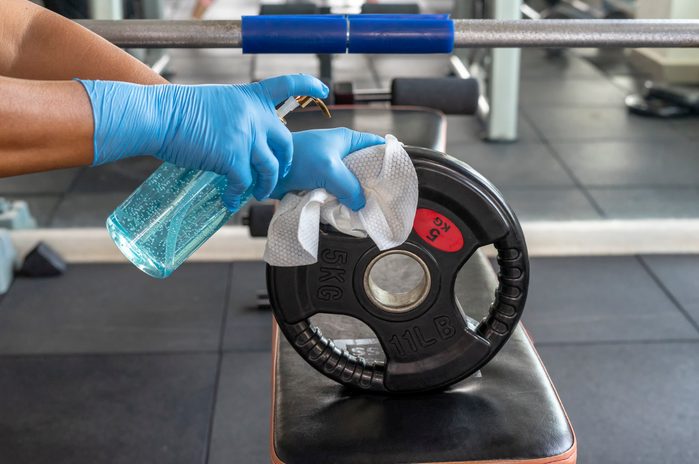
Wipe down equipment with sanitizing spray or wipes
Says Banjoko: always wipe down equipment after using it, even if you don’t see that you’ve left visible sweat marks. It doesn’t hurt to also wipe it down before you use it, she adds. Your gym should provide sanitizing spray or wipes. (If they’re not, talk with the manager or drop a note in the comments box!)
And, in case this one ins’t now obvious: don’t forget to wipe down your bike seat!
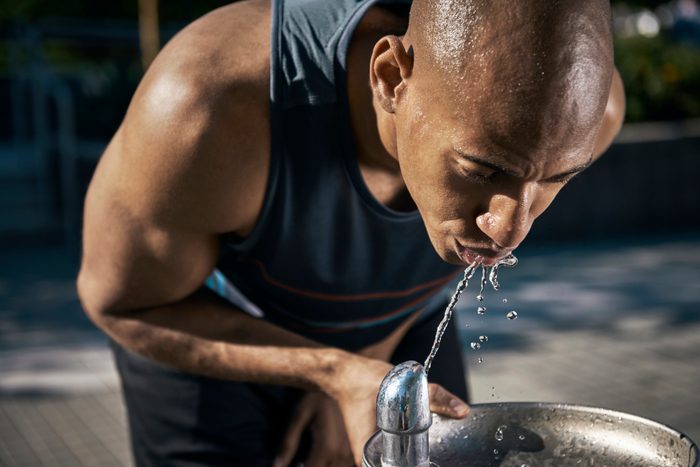
Do not spit into drinking fountains (or anywhere in the gym)
Spitting or hawking a loogie into a water fountain or sink was considered bad form before the pandemic, yet plenty of people still did it. Now, however, it’s a huge no-no. Bodily fluids, including saliva, are a primary way germs are transmitted, says Banjoko.
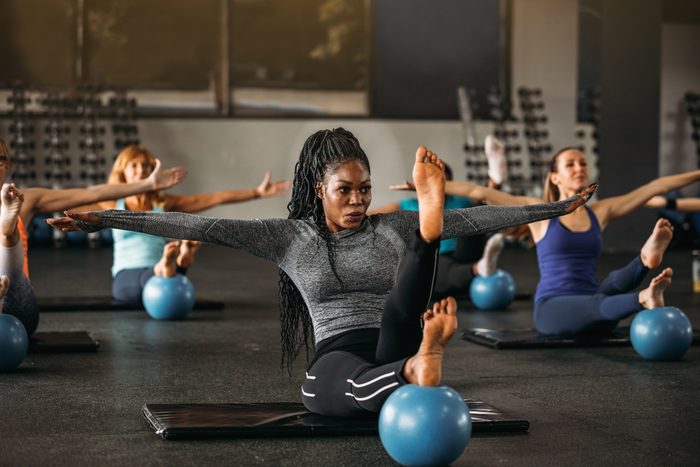
Respect class size limits
It can be tempting to sneak into the back of a full fitness class—but not only can this cause discomfort for others, it can also increase your risk for catching or sharing an illness.
Gym managers set class sizes at a certain limit based on public health guidelines.
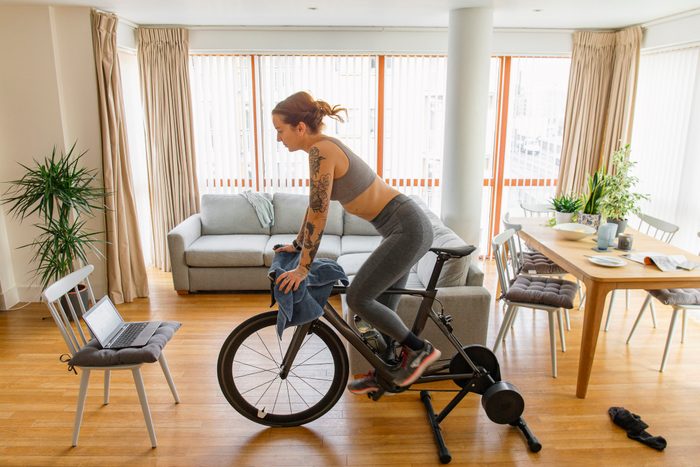
Stay home when you’re sick
If you feel ill, the best thing you can do for yourself and other gym goers is to stay home until you recover, says Dr. DeHart. Pre-pandemic, people were sometimes encouraged to “push through” mild illness with a workout, or to come sit in the sauna or hot tub to help ameliorate symptoms.
These days? Yeah—stay home and rest.
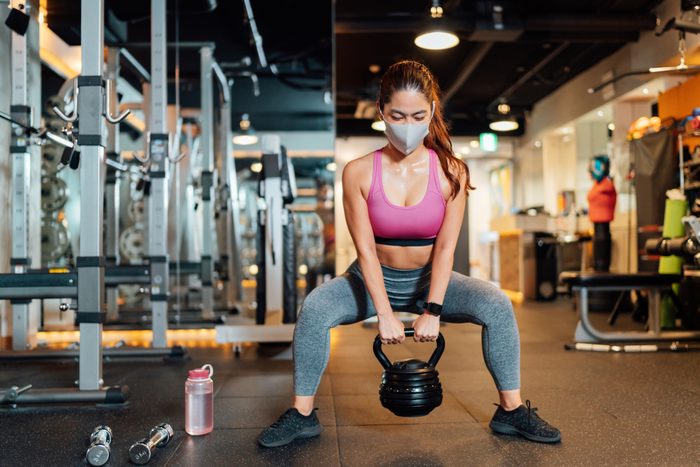
Wear a mask when you have symptoms
Masks aren’t just helpful in protecting against Covid-19! If you have a runny nose, sore throat, cough, or other symptoms and there’s some possibility you’re starting to get sick—or if you’re on the tail end of recovering from any type of cold, flu or illness—wear a mask in public and private gatherings to be safe, recommends Dr. DeHart.
This Smart COVID Test Should Be on Your Radar Before the Holidays, a Health Reporter Says
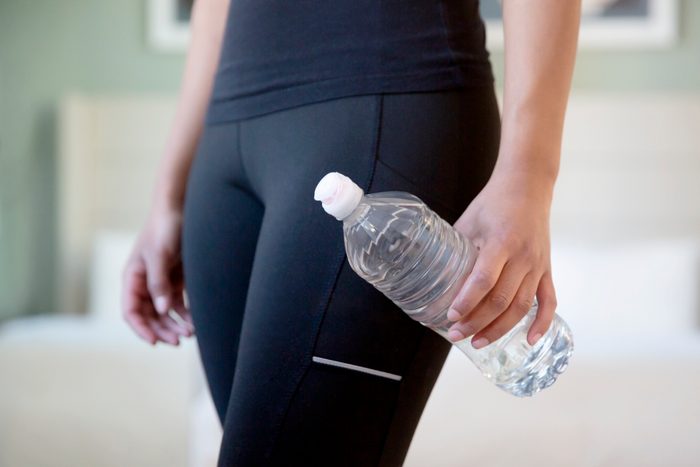
Clean up your messes
Germs can be passed through dirty towels, used tissues, water bottles, food and other items, so it’s good gym etiquette to just be polite and clean up after yourself, says Dr. DeHart.
This means disposing of garbage and placing dirty towels in the proper place.
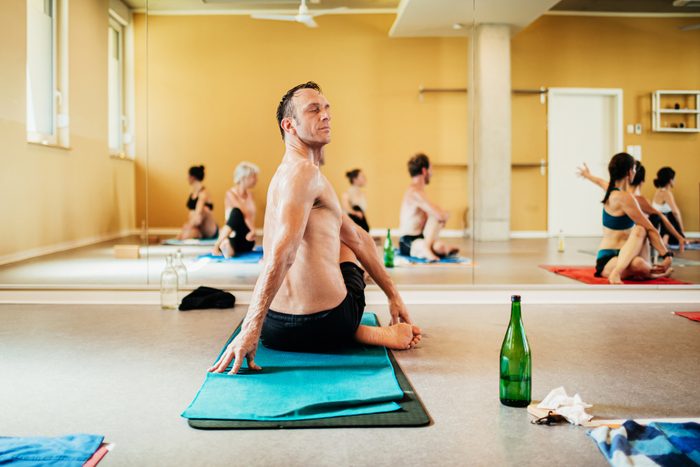
Put a towel down
Skin and other infections can be transmitted through sharing surfaces, like a weight bench or a sauna seat. Place a clean towel down before you put your bare skin on any surface, says Banjoko. If you do leave a sweat puddle on equipment or the floor (it happens!), be sure to use a clean towel or disposable wipe to mop it up.

Stay current on your vaccines
Getting regularly vaccinated against the flu and Covid-19, along with staying on top of your boosters for regular vaccines (like those that protect against tetanus, pneumonia, meningitis, pertussis, and shingles) will protect you and your fellow gym-goers, says Dr. Dehart.
Which Vaccines Do You Need in 2022-23? Here’s the Breakdown for All Ages
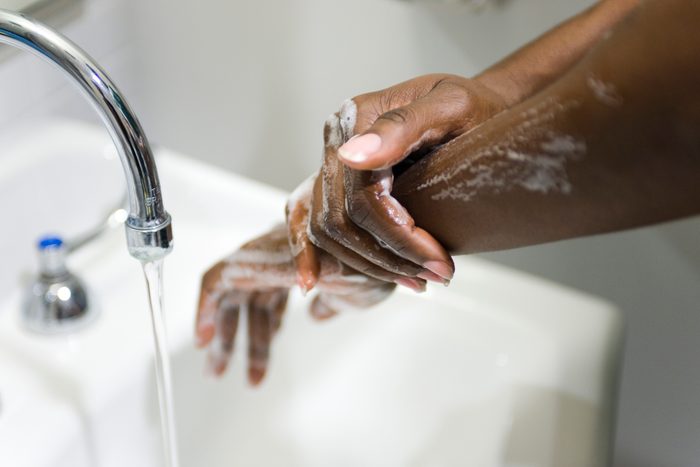
Wash your hands after exercise
Post-potty hand-washing is good, but it’s not enough these days. You should also be washing or using hand sanitizer when you finish your workout, says Banjoko.
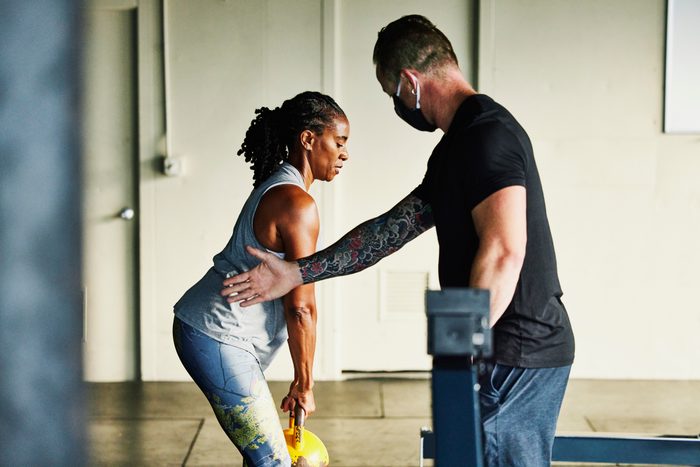
Don’t police other people’s health choices
Boyd flags this: when it comes to mask-wearing, vaccines, or other health choices, try not to be judgmental of what others are doing. “We don’t know the personal situation, their worries or concerns. Just because something works for you doesn’t mean that everyone should do the same,” she says.
If you’re concerned that someone isn’t following the official public health policy at the time, take your concerns to gym management rather than confronting them yourself.
The 3 Words You Need for Any Conflict, from a Holocaust Survivor and Psychologist
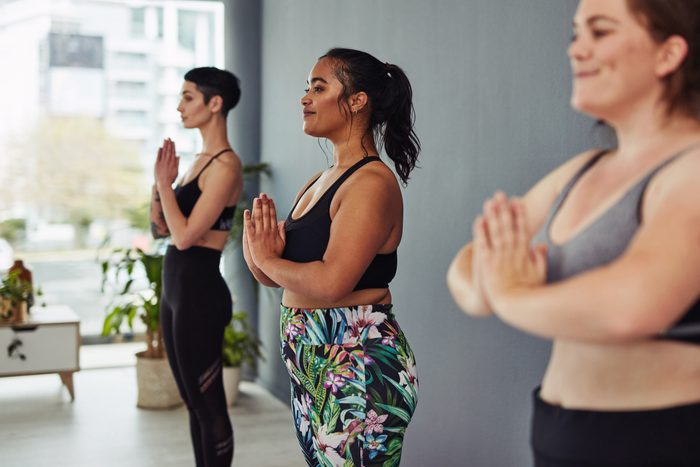
Make it a habit
None of these rules are terribly surprising…so why don’t people follow them? Boyd says the problem is that we can so easily fall back into old habits—but that practicing good hygiene at the gym is considerate of others, and also can serve as a good example. “Taking a moment to clean up after oneself shouldn’t be seen as an inconvenience, but as a way of showing respect,” she says.
Get The Healthy @Reader’s Digest newsletter. For more wellness updates, follow The Healthy on Facebook, Instagram, and Twitter. Keep reading:
- Eating These Foods Can Lead to Premature Death, Says New Study
- One Major Effect Walking Has on Your Dementia Risk, Says Research
- What Are the Best Foods to Fight Cancer? Here’s What’s in a Cancer Dietitian’s Fridge
- Howie Mandel Details His Obsessive-Compulsive Disorder: ‘People Need to Know They Are Not Alone’

